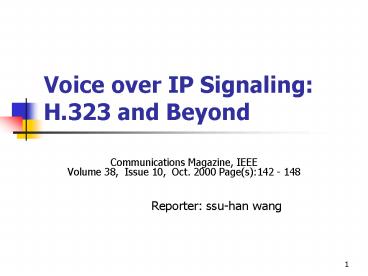Voice over IP Signaling: H'323 and Beyond - PowerPoint PPT Presentation
1 / 21
Title:
Voice over IP Signaling: H'323 and Beyond
Description:
call control resides in one box, called the media gateway controller ,and media ... in the network that provides real-time two way communications between H.323 TEs ... – PowerPoint PPT presentation
Number of Views:44
Avg rating:3.0/5.0
Title: Voice over IP Signaling: H'323 and Beyond
1
Voice over IP SignalingH.323 and Beyond
- Communications Magazine, IEEEVolume 38, Issue
10, Oct. 2000 Page(s)142 - 148 - Reporter ssu-han wang
2
OUTLINE
- INTRODUCTION
- AN H.323 NETWORK
- THE H.323 ARCHITECTURE
- H.323 SIGNALING AND CONTROL
- H.323 INTERWORKING WITHTHE PSTN
- SUMMARY
3
INTRODUCTION(1/2)
- Signaling is one of the most important fun-ctions
in the telecommunications infra-structure. - VoIP industry has gone through three stages in
terms of signaling protocol evolution
precommercial (19801995), PC-centric
(19951998),and carrier grade (1998 on).
4
INTRODUCTION(2/2)
- H.323 v. 1, referred to as a standard for
realtime videoconferencing over non-guaranteed
quality of service (QoS) LANs. - call control resides in one box, called the media
gateway controller ,and media transformation
resides in another box called the media gateway.
5
An H.323 network
6
THE H.323 ARCHITECTURE(1/2)
- Terminal
- An H.323 TE is an endpoint in the network,
which provides for real-time two-way
communications with another H.323 terminal, GW,
or MCU. - Gatekeeper
- The GK is an H.323 entity in the network that
provides address translation and controls access
to the network for H.323 terminals, GWs, and MCUs
7
THE H.323 ARCHITECTURE(2/2)
- Gateway
- An H.323 GW is an endpoint in the network
that provides real-time two way communications
between H.323 TEs on the packet-based network and
ter-minals on the PSTN. - Multipoint control unit
- The MCU is an endpoint in the network that
provides the capability for three or more
terminals and GWs to participate in a multipoint
conference.
8
H.323 SIGNALING AND CONTROL(1/2)
- Registration Admission and Status (RAS)
- RAS is a transaction-oriented protocol
between an H.323 endpoint (usually a TE or GW)
and a GK. - Q.931
- Q.931 is the signaling protocol for call
setup and teardown between two H.323 TEs and is a
variation of the Q.931 protocol defined for PSTN.
9
H.323 SIGNALING AND CONTROL(2/2)
- H.245
- H.245 is used for connection control
- Real-Time Transmission Protocol
- RTP is used as the transport protocol for
packetized VoIP in H.323.
10
Protocol relationships in H.323
11
The seven phases of an H.323 call
12
Two call control models are supported in H.323
- direct call model
- In the direct call model, all Q.931 and H.245
signaling messages are Exchanged directly between
the two endpoints. - GK-routed call
- In the GK-routed call model, all signaling
- messages are routed through the GK cloud.
13
The direct and gatekeeper-routed call models of
H.323
14
H.323 INTERWORKING WITHTHE PSTN
- PSTN interfaces
- VoIP interfaces
- Signaling conversion
- Media transformation
15
Components of a gateway bridg-ing the PSTN and
the Internet
16
H.323 gateways have the following limitations
- Scalability
- The maximum number of lines an H.323 GW can
support is a few thousand. - SS7 connectivity
- Without SS7 connectivity,VoIP cannot provide
the same rich set of services. - Availability
- When a GW is down, all active calls through
the GW disappear. There was no mechanism in H.323
for failover.
17
HOW TO OVERCOME(1/2)
- Scalability
- use one MGC to control multiple MGswe have in
- effect built a virtual H.323 GW that can
- handle more lines.
- SS7 connectivity
- This can be done by connecting the SG
function to the SS7 network.
18
HOW TO OVERCOME(2/2)
- Availability
- multiple MGCs can be used to control a single
MG. If one MGC fails, but call states are kept in
stable storage, one can apply traditional
failover procedures to switch to another MGC.
19
FUNCTIONAL DECOMPOSI-TION OF H.323 GATEWAYS
- Signaling gateway (SG)
- Provides the signaling mediation function
between - the IP and PSTN domains.
- Media gateway (MG)
- It maps or transcodes the media in the IP
domain and media in the PSTN domain - Media gateway controller (MGC)
- Provides the call processing (callhandling)
20
The ESTI-TIPHON functional decomposition
reference model
21
SUMMARY
- H.323 was the first VoIP standard that helped
move the VoIP industry away from proprietary
solutions and toward interoperable products. - It is unclear how the VoIP signaling architecture
will eventually evolve, but it is clear that
these different signaling protocols will need to
coexist for some time.































